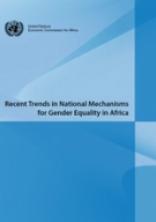Recent Trends in National Mechanisms for Gender Equality in Africa

This study presents a situation analysis of the status of national mechanisms in the 53 Member States in Africa over the last five years. It argues that contexts such as economic liberalization policies since the 1980s and the role of the State and political reform have shaped the development and current situation of the mechanisms. Within these contexts, national mechanisms have evolved in significant ways.
One recent key trend is the increasing popularity of ministries or ministerial departments for women as lead institutional mechanisms. Instruments to advance gender equality such as legislative reform and gender-responsive budgeting have also become very popular amongst national machineries over the last few years. The main areas of emphasis of institutional mechanisms have been influenced by the Beijing Platform for Action, resulting in continuities and a certain homogenisation in their priorities.